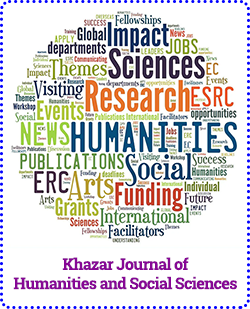The Construction of Geography by Nationalism: Homeland, Motherland, Fatherland
DOI:
https://doi.org/10.5782/2223-2621.2021.24.1.5Keywords:
Nationalism, Geography, Homeland, Motherland, FatherlandAbstract
In this study, the relationship between space and geography in the composition of nationalism is examined. As a modern ideology, nationalism has been the most powerful ideology for the last two centuries that have shaped the world map, constructing identities and influencing people’s worlds of meaning. Understanding the content of nationalism, which is such a powerful ideology, is essential in understanding today’s events. Therefore, in the present study, the relationship between nationalism and geography is explained through the concept of space, which is one of the two components of identity phenomena. This statement, what is the effect of geography on the composition of nationalism? The answer to the question is made around. It is necessary to understand the conceptual and methodological frameworks of the study to answer this question. The literature review constitutes the methodological framework of the study. The literature on nationalism has been analyzed in this manner. The conceptual framework, on the other hand, constitutes nationalism, nationalism-nation, and nationalism-geography relations. French, German and Turkish nationalisms explain the concepts of homeland, motherland, and fatherland. Consequently, it can be said that in addition to the role of geography in understanding nationalism, it also determines the forms of nationalism concerning the concepts of homeland, motherland, and fatherland.
Downloads
References
- Anderson, B. (2011). Hayali Cemaatler. Çev. İskender Savaşır, İstanbul: Metis Yayıncılık.
- Bölükbaşı, Y. Z. (2020). Milliyetçilik ve Dış Politika: Türkiye’nin Kuzey Irak ve İsrail Politikalarına Teorik Bir Bakış. 2. Baskı. Ankara: Gazi Kitabevi.
- Breuilly, J. (1993). Nationalism and the State. Manchester: Manchester University Press.
- Brubaker, R. (2002). Fransa ve Almanya’da Vatandaşlık ve Ulus Ruhu. Çev. Vahide Pekel, Ankara: Dost Kitabevi.
- Doğan, F. (2019). Alman Milliyetçiliği, Ed. Gökberk Yücel, Milliyetçiliğin Coğrafyaları, Ankara: Gazi Kitabevi, pp. 1-16.
- Durgun, Ş. ve Yücel, G. (2019). Türk Milliyetçiliği: Tanım, Teori ve Süreç, Ed. Ömer Baykal, Cumhuriyet Döneminde Siyasi Düşünce. Ankara: A Kitap, pp. 181-209.
- Calhoun, C. (2012). Milliyetçilik. Çev. Bilgen Sütçüoğlu, İstanbul: İstanbul Bilgi Üniversitesi Yayınları.
- Gellner, E. (2008). Uluslar ve Ulusçuluk. Çev. Günay Göksu Özdoğan ve Bahar Büşra Ersanlı, İstanbul: Hil Yayınları.
- Greenfeld, L. (2019). Nationalism: A Short History. Washington D. C.: Brookings Institution Press.
- Grosby, S. (2005). Nationalism: A Very Short Introduction. Oxford-New York: Oxford University Press.
- Hobsbawm, E. J. (2010). Milletler ve Milliyetçilik. Çev. Osman Akınhay, İstanbul: Ayrıntı Yayınları.
- Hooson, D. (2001). Geography and Nationalism, Ed. Athanea S. Leoussi, Encyclopaedia of Nationalism, New Brunswick and London: Transaction Publishers, pp. 113-116.
- Kaiser, R. (2009). Homeland/Motherland/Fatherland, Ed. Thrift and R. Kitchen, International Encyclopedia of Human Geography, Oxford: Elsevier, pp. 21-28.
- Keitner, C. I. (2007). The Paradoxes of Nationalism: The French Revolution and Its Meaning for Contemporary Nation Building. New York: The State of New York University.
- Kellas, J. G. (1998). The Politics of Nationalism and Ethnicity. London: Macmillan.
- Kohn, H. (1960). The Idea of Nationalism: A Study of Its Origins and Backgraund. New York: Macmillan.
- Llobera, J. R. (2007). Modernliğin Tanrısı Batı Avrupa’da Milliyetçiliğin Gelişimi. Çev. Emek Akman ve Ebru Akman. Ankara: Phoenix Yayınevi.
- Motyl, A. J. (2001). Encyclopedia of Nationalism Vol 2. California and London: Academic Press.
- Nora, P. (2006). Hafıza Mekânları. Çev. Mehmet Emin Özcan. Ankara: Dost Kitabevi.
- Olgun, H. (2012). Nazi Ekololojisi, Ed. Orçun İmga ve Hakan Olgun, Yeşil ve Siyaset, Ankara: Lotus Yayınevi, pp. 222-241.
- Renan, E. (1946). Nutuklar ve Konferanslar. Ankara: Milli Eğitim Bakanlığı Yayınları.
- Rude, G. (2018). Fransız Devrimi. Çev. Ali İhsan Dalgıç, İstanbul: İletişim Yayınevi.
- Schöpflin, G. (2001). Nationalism: Evolution of Nationalism, Ed. Athanea S. Leoussi, Encyclopaedia of Nationalism, New Brunswick and London: Transaction Publishers, pp. 225-228.
- Smith, A. D. (2010). Nationalism: Theory, Ideology, History. Cambridge-Malden: Polity Press.
- Staudenmaier, P. (2011). Fascist Ecology: The Green Wing of the Nazi Party and its Historical Antecedents. Ed. Janet Biehl and Peter Staudenmaier, Porsgrunn: New Compass Press, pp. 13-42.
- Yücel, G. (2020a). Meşrutiyet’ten Cumhuriyet’e Ana Akım Siyasî Partiler (1889-1930). Ankara: Gazi Kitabevi.
- Yücel, G. (2020b). Türk Milliyetçiliğinin Terkibinde Mekân. Ankara: Gazi Kitabevi.








